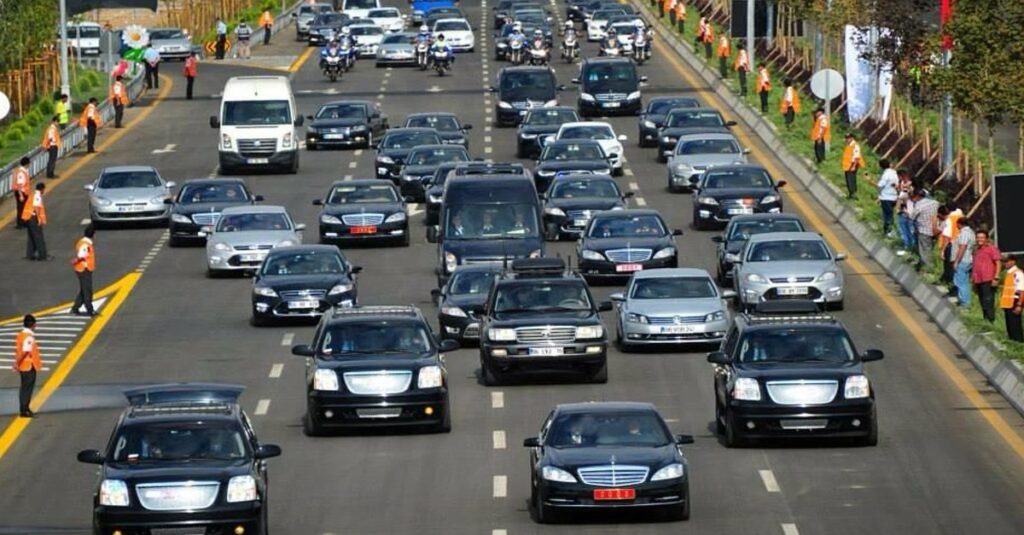President Recep Tayyip Erdoğan’s enormous convoy in Berlin for the Euro 2024 quarterfinal match has drawn sharp criticism amid austerity measures currently being implemented in Turkey.
Erdoğan attended the match between the Netherlands and Turkey following national player Merih Demiral’s UEFA penalty for giving a controversial salute at a game against Austria in the round of 16 on July 2. The salute, which Demiral made to the crowd after scoring his second goal in Turkey’s 2-1 victory game, is associated with Turkish ultranationalist group the Grey Wolves.
The Turkish president was accompanied by an extremely large convoy, surprising many Germans and raising questions back home about government spending.
📹 Erdoğan's convoy in Berlin. pic.twitter.com/V4NE6ZUlRw
— Journalite (@journaIite) July 7, 2024
The Turkish Football Federation (TFF) has been under fire after sports journalist Tahir Kum claimed in June that the organization took 613 people to Germany as official invitees for the tournament, spending over 3 million euros. This comes amid a backdrop of economic hardship and austerity measures aimed at reducing public spending in Turkey.
Critics argue that Erdoğan’s convoy contrasts starkly with the government’s austerity measures aimed at curbing inflation and reducing public spending. Labor unions, economists and politicians have voiced concerns that the austerity measures disproportionately affect low-income individuals while sparing the wealthy and those in power.
Economist Mahfi Eğilmez criticized the measures on X, stating that they are ineffective without addressing wasteful spending on the presidential palace, airplanes and convoys. Opposition party leaders echoed these concerns, with Republican People’s Party (CHP) leader Özgür Özel calling the austerity plan a “hidden IMF program” that burdens the public.
The TFF’s decision to host over 600 invitees at Euro 2024 has also sparked controversy. Kum described TFF President Mehmet Büyükekşi’s actions as a “wasteful project,” noting that the organization spent a significant amount on the event despite recent economic challenges.
In response, the TFF issued a statement asserting that only 197 officials and guests were taken to Germany.
“A total of 121 guests and officials, including 38 TFF executive board members, 26 staff, 14 club representatives, 23 media executives and 20 coaches, trainers and former national team players, were taken to Germany,” the TFF said. Additionally, 76 guests from national team and TFF sponsors were included, bringing the total to 197.
The timing of these lavish expenditures is particularly controversial given the recent “Austerity Measures Circular” published by the Turkish government in May. Vice President Cevdet Yılmaz and Finance Minister Mehmet Şimşek announced the plan, which includes a three-year moratorium on new vehicle and office equipment purchases for the public sector and a halt to new public building construction, except for health, security or defense purposes.
The austerity measures are expected to save the government approximately 100 billion lira ($3.1 billion). However, critics argue that these measures fail to address the root causes of economic hardship and disproportionately impact public sector workers and low-income individuals.
Social media has been abuzz with reactions to the news, with many citizens expressing frustration over the perceived disconnect between the government’s lavish spending and the economic struggles faced by ordinary people. Incidents like the TFF’s large delegation to Germany and Erdoğan’s extravagant convoy are seen as emblematic of a broader issue of mismanagement and wasteful spending.

